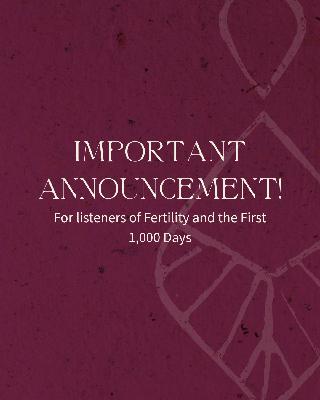Ep70 - The Micronutrients Series - Water Soluble Vitamins Pt3 (Vitamin B continued)
Description
Hello, I'm Katie Bradbury, nutritional therapist and registered nurse. Today's podcast episode is called The Micronutrient Series - Water Soluble Vitamins - Part Three.
So hello, and welcome to today's episode. I really hope that you're doing well. I am continuing this episode with the final instalment of the vitamins section of my micronutrient mini series. Now, that might be a bit of a mouthful, and it might not sound particularly exciting. If you're on a fertility journey, and you're new to the podcast, you might want to start an episode that feels more relatable to you in terms of where you're at right now. I've got plenty of previous content, including things such as how gut health relates to fertility, and I've got episodes on pregnancy loss, I've got lots of episodes on nutrition and nutrition as a whole and its' impact on fertility. I've got episodes on stress and impact of disordered eating and vaginal health and sperm power. So lots and lots of things to choose from. If you're a bit of a 'Fertility and the first 1000 days' podcast connoisseur, then this is absolutely the right place for you. And even if you've got an in depth knowledge or an in depth interest in nutrition, then this could be really interesting for you. So the micronutrient mini series, I've been just shining the spotlight on the micronutrients. So the micronutrients, mainly we're thinking about the vitamins and minerals - and there are lots and lots of different vitamins and minerals. I'm slowly working my way through them because I speak a lot about the balance of the macronutrients in terms of carbohydrates, and proteins and fats. I speak a lot about proportions - what sort of proportions on a plate we should be looking at, ideally in terms of those three food groups and how vegetables fit into that as well. But really, within that are these little superheroes, which are the micronutrients and the micronutrients are responsible for hundreds or thousands of processes within the body. That includes for fertility; whether that's to do with hormone synthesis, whether it's to do with egg health, whether it's to do with gene transcription, when we're actually creating a baby, whether it's to do with any kind of chemical messaging within the brain. Each of the micronutrients has a super important role to play and if you've been listening to the micronutrient series, within this podcast so far (because I have already covered the fat soluble vitamins, so vitamins A, D, E, and K, and I've covered most of the water soluble vitamins, so vitamin C, and I gave a bit of an overview of the B vitamins last episode) if you have been listening to that so far, then hopefully you're starting to get an idea of the importance, individually, of some of these nutrients. So it really is a matter of letting no man be left behind when it comes to these micronutrients. I'm hoping that with these episodes, it will help you to reflect on what your current nutrient intake looks like at the moment. I'm not thinking about supplements here; I'm thinking about diet, I'm thinking about what you're what you're actually consuming, because we always need to be thinking about nutrition first, the diet always comes first and the supplements are there to supplement that. So thinking about your own diet and hopefully this might help you, this micronutrient mini series, to identify whether there might be any possible nutrient, even if not nutrient deficiencies then nutrient insufficiencies, like not getting enough for your needs from a fertility point of view. So without further ado - I said last episode that there are quite a few B vitamins, so we've got B1, B2, B3, B5, B6
B9 and B12, so there are quite a number of them - and rather than shine the spotlight on every single one of them as an individual in each episode as I've done it in the previous episodes, because the B vitamins, as I explained last week, work really well collectively together. That's why they're often found in a B complex in supplements and in vitamin products. And there's a lot of overlap, there's a lot of crossover in the roles they play. So overall, as I said, last week, we're thinking about energy production, we're thinking about gene transcription. And I thought I'd just following last week's episodes, where I gave a bit of an overview on the B vitamins as a whole, I thought I'd just shine the spotlight this week on three of my favourite B vitamins because I do have favourites. And these are ones that I'm often thinking about in the context of fertility, and they're often ones that I'm wanting to ensure are found in adequate amounts for my fertility clients. And I often check their levels of some of these B vitamins using blood testing. So starting from B6, where as I explained last week, about the B vitamins as a whole being linked to energy production and metabolism, and I guess, being quite excitatory in that respect for our cells, B6, although it is involved in energy production, it's genuinely seen as quite a calming micronutrient. And the reason for that is because it's linked in with our neurotransmitter production. And it's specifically it's a bit of an enzymatic precursor to serotonin, which is, you know, it's quite, it's a bit of a happy hormone, I guess. And so, I'm often thinking about vitamin B6. And I'd love to know if this is you, because this is a lot of my clients. And a lot of my clients are really caught up in their head. And that's easily done when you're on a fertility journey, because it's a rough ride, and I get that, but lots of the people that come to me as one to one clients are, and I'm the same I've done a lot of work on this, but my predisposition, is to be quite high anxiety and lots of people are and so if you are typically a bit of an anxious person, and especially if you get anxious or angry even around the time of your menstrual cycle, so you know, in that pre menstrual period, then I'm often thinking about B6 for those kind of clients. And wondering whether their B6 might be either a bit on the low side because of dietary intake, or because they're using it up a little bit faster. And because of that anxiety disposition, so B6, that's why it's one of my favourites because it is quite a calming one and it's often overlooked as well. So B6 in terms of its, of course, it does still do all those other functions around helping to convert food into energy. It helps to make red blood cells as well which is super important. And critically, it helps to maintain and these three super B vitamins if you like these B6, B9 folate and the B12 that I'm talking about today, these all worked together really beautifully these three to help maintain normal levels of homocysteine in the blood. Now homocysteine is an inflammatory marker. So when homocysteine is elevated over time, for various reasons, it can contribute to long term inflammation and it is a risk factor for cardiovascular disease and those big killers in the modern world. Now I know this podcast isn't about kind of cardiovascular disease and overall health. However, if you listen back to my most quoted podcast in the series, which is the fire that stops you from getting pregnant, we can really pinpoint that inflammation and various inflammatory mechanisms over time
is really one of the key drivers that we want to be minimising, we really want to be dampening down those inflammatory responses when we're thinking about fertility, because when we're thinking about if the body is inflamed for whatever reason, then it's going to be prioritising that, because inflammation is critically associated as far as that on a cellular level with a threat to life. And so our body will always be prioritising the threat to life over reproductive health. So we want to be keeping inflammation in check. And so these three B vitamins work together to actually help recycle homocysteine into another product called methionine, which in turn turns into a product called SAM-e, which is called a methyl donor, which just helps in the methylation process, which is responsible for normal hormone production and general metabolism, detoxification and gene transcription. So all of those things, all of those processes are really important in the context of fertility, the three super B vitamins that I'm talking to you about today, the B6, B9 and B12, they all work together to help to normalise levels of homocysteine in the bloodstream and thus lower inflammation. So good sources of B6 include fish, so things like salmon, tuna, halibut, any kind of fish really, but those three are probably the highest. Poultry - so chicken, turkey, duck, and also nuts. So hazelnuts, walnuts, pistachios, those are all really nice sources of vitamin B6. So to move on to vitamin B9, which is folate, so I do have a whole podcast episode related to folate in a previous one. So this is a bit more of a snapshot of folate, but if you do want to hear more about the importance of folate, and how critical it is for reproductive health, please do go back and listen to that episode. I'll link to it in the show notes. But folate, vitamin B9, you may know it as folic acid. So lots and lots of people do supplement with folic acid and indeed the NHS recommendations of everyone who's trying to get pregnant to supplement with folic acid for at least three months before trying to conceive. And the reason for that is because of this link. And it's actually because of this link to that methylation process that I just mentioned. But how that plays out is, it was found in the research, that people who had lower levels of folate are at higher risk for having birth defects, namely neural tube defects like spina bifida. So as a preventative measure for that the NHS guidelines is to take 400 micrograms of folic acid prior to conceiving to help reduce the likelihood of that, now, that is a bit of a cont

















